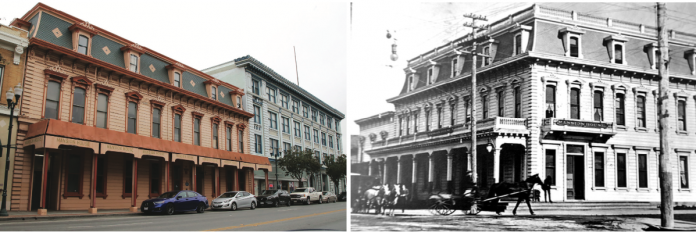WATSONVILLE—Watsonville’s Mansion House was built in an era when horse-drawn carriages and motor coaches shared unpaved roads, and served as a luxurious stopover for visitors to the agricultural epicenter that was Watsonville.
The Mansion House, a centerpiece of Watsonville’s historic downtown, will turn 150 this year.
Built in 1871 on the corner of Third (now East Beach Street) and Main streets, the Mansion House is the oldest surviving commercial facility in the Pajaro Valley, according to the Pajaro Valley Historical Association. Constructed by Thomas Beck, the Second Empire-style building shows overtones of Paris architecture around 1852 through 1857.
Lou Arbanas of PVHA said that at the time the Mansion House was built it stood as a top-shelf hotel on California’s Central Coast. One noteworthy guest was Civil War general Ulysses S. Grant, who served as 18th president of the United States from 1869 to 1877.
In 1906 the building lost its cornerstone status across the street from the City Plaza and was moved next door, northward to where it now stands. Arbanas said he recalls his father’s story, who was then a 14-year-old boy, watching the massive structure being inched along atop giant 100-foot rolling logs pulled by a team of oxen. The building had been purchased by Mateo and M.N. Lettunich, hence the now historic Lettunich Building that now stands in the Mansion House’s former spot.
“People would come to town to purchase apples, among other things, and many would end up staying at the Mansion House,” Arbanas said. “If you can imagine, people coming into town with herds of goats and cattle while riding horses. Stagecoaches and the first motor coaches would come through: This spot was technically ground zero for Watsonville. The plaza would end up being packed at times with such activity. And the Mansion House was right there in the middle of it all.”
Arbanas described the structure as a “signature building,” a hotel with high-quality craftsmanship built of local lumber from Corralitos with a bar and restaurant on the ground floor and its notable French Mansard roof.
“This was when the original bandstand in the Plaza was wood and Ford’s Department Store was directly across Main Street,” Arbanas said.
The original Mansion House “was 90 by 100 feet, had 65 rooms and commanded a full view of the valley, being three stories,” historian Betty Lewis wrote in “Watsonville, Memories That Linger.”
“There was gas and water laid to every room … and the Pacific telegraph Co. had an office inside the Mansion House with W.E. Peck as operator,” Lewis wrote.
The Washington Hotel, Roma Hotel, the Appleton Hotel, Scott Boarding House, The Lewis House, Hoffman Hotel, the New Hotel and Hotel Johnson were just a sampling of the lodging available in the late 1800s and into the next century, advertised as headquarters for tourists and travelers. Then, in 1927 came the Resetar Hotel, another Main Street cornerstone.
The Mansion House, in 1978, almost went the way of the wrecking ball, but the owners donated it instead to PVHA, who later sold it. For several years the New China Buffet restaurant operated on the ground floor of the Mansion House but it has since closed. That restaurant opened in the early 2000s. Before that, a fine dining destination featuring California cuisine called the ground floor home.









